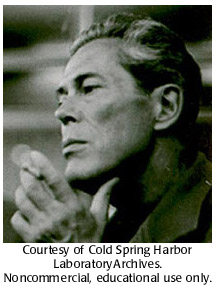Concept 33 Genes can be turned on and off.

 Jacques Monod and François Jacob were the first to discover how genes were turned on and off.
Jacques Monod and François Jacob were the first to discover how genes were turned on and off.
- Go to:
- François Jacob (1920-)
Jacques Lucien Monod (1910-1976)

Jacques Lucien Monod was born in Paris on February 9, 1910 but he grew up in sunny Cannes, home to the Cannes Film Festival. This may explain why Monod has been described as having an actor's craving for attention.
Monod's father, Lucien, was a portrait artist, and his mother, Charlotte Todd, came from Milwaukee, Wisconsin. As a child, Monod climbed rocks, sailed yachts, hunted for fossils, and dissected cats while learning to read Greek and play the cello. By age 16, he decided to become a biologist to explain how living things work in terms that did not violate the laws of physics.
Monod returned to Paris in 1928 to study natural sciences at the Sorbonne. He was convinced that genetics held the key to explaining life in these terms. He received his degree in 1931 and started pursuing a Ph.D. During this time, Boris Ephrussi took him to Caltech, the epicenter of genetics. In The Eighth Day of Creation, Ephrussi complained, "I brought him to California to study genetics. He made my life miserable."
Though Monod confessed he goofed off in California, he did impress the local residents with his musical abilities. He conducted concerts for American millionaires who tried to hire him for their local orchestra.
Monod ultimately rejected a career in music and returned to Paris to finish his degree. In 1938 he married the archeologist Odette Bruhl and, in 1939, became the father of twin boys. In 1940 he received his Ph.D. and joined the French Resistance.
During the war, Monod was elevated to the chief of staff of operations for the Forces Françaises de l'Interieur. In preparation for the Allied landings, he arranged parachute drops of weapons, railroad bombings, and mail interceptions. He also continued working with bacteria, the little creatures he could manipulate like chemicals.
The work Monod did with bacteria during the war eventually grew into the famous PaJaMo experiment - Arthur Pardee, François Jacob, and Monod's study that showed bacteria make an inhibitor to keep beta-galactosidase production turned off.
By the time the lac operon system was worked out, Monod switched his curiosity to allostery. Monod called the concept - in which an enzyme's active site changes shape when it binds an effector molecule - the second secret of life.
In the latter part of his career, Monod interpreted the findings of molecular biology for the general public in his book, Chance and Necessity, and directed the Institut Pasteur. Monod died on May 31, 1976 of leukemia; his last words were "Je cherche a comprendre" (I am trying to understand.)


Though Jacob and Monod's model depended on the existence of the inhibitor, they never isolated this protein.

Why was the inhibitor so difficult to find?
 DNA is packaged in a chromosome.
DNA is packaged in a chromosome. Higher cells incorporate an ancient chromosome.
Higher cells incorporate an ancient chromosome. Some DNA does not encode protein.
Some DNA does not encode protein. Some DNA can jump.
Some DNA can jump. Genes can be turned on and off.
Genes can be turned on and off. Genes can be moved between species.
Genes can be moved between species. DNA responds to signals from outside the cell.
DNA responds to signals from outside the cell. Different genes are active in different kinds of cells.
Different genes are active in different kinds of cells. Master genes control basic body plans.
Master genes control basic body plans. Development balances cell growth and death.
Development balances cell growth and death. A genome is an entire set of genes.
A genome is an entire set of genes. Living things share common genes.
Living things share common genes. DNA is only the beginning for understanding the human genome.
DNA is only the beginning for understanding the human genome.